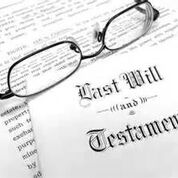An executor steps in for the person who wrote the will and makes sure that all the final arrangements are carried out. When you agree to be named the executor or personal representative of an estate, it’s a big decision. It is far more significant than most people realize. There are many responsibilities to think about, before agreeing to take on the role. Investopedia’s recent article, “5 Things to Consider Before Becoming an Estate Executor” lists five things to consider before saying yes.

- Complexity of the Estate. Typically, the larger the estate—which can be in terms of property, possessions, assets or the number of beneficiaries—the harder and more time consuming it will be. The best way to see how difficult the job will be, is to request to see a copy of the current will. If there are obvious red flags, like unequal distributions to children or trusts or annuities, it may be best to say no.
- Time Commitment. This job takes time and energy, and requires a lot of attention to detail. Truth be told, almost all has to do with the details. Before you agree to execute a will, you should be sure that you have the time to do the job. It’s also important to review your decision to serve as an executor every time your situation changes, like when you get married, have children or change locations. It’s not unusual for a testator to change executors throughout a lifetime.
- Immediate Responsibilities. You may agree to be an executor, thinking that it’ll be years before you have to do any work. However, that’s not always the case. You should be sure the testator is keeping a list of assets and debts and knows where the original will, and the asset list are being held and how to access them. You should also have a list of the contact info for attorneys or agents named by the testator. You can also discuss the testator's wishes for a funeral or memorial service, including instructions for burial or cremation.
- Duties After the Testator Dies. This is when the executor must make funeral arrangements, locate the will, initiate probate, manage assets, pay all debts, submit tax returns and more. This can be a snap, if you’re organized and detail oriented.
- How You’ll Be Paid. Each state has laws on how an executor is paid. An executor is also entitled to be compensated for expenses incurred, as they carry out their responsibilities. Executors can also refuse compensation, which is common if you’re doing this for a member of your family.
It’s an honor to be asked to be an executor. It means the testator trusts you to carry out their final wishes and to see to their legacy. However, be sure that you’re up to the task.
Reference: Investopedia (June 25, 2019) “5 Things to Consider Before Becoming an Estate Executor”


